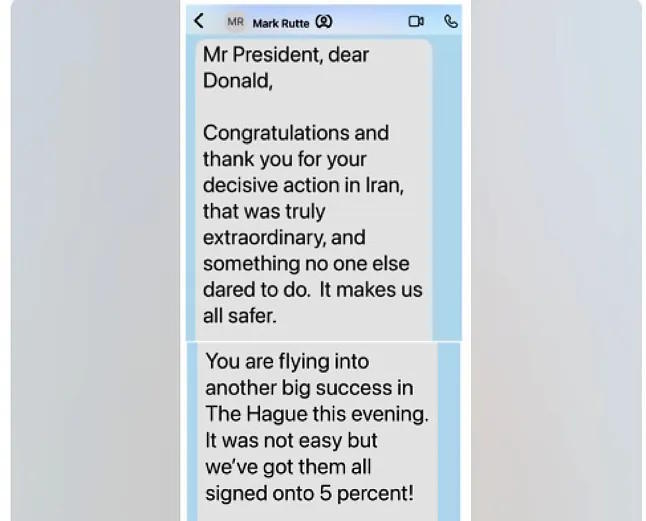"Mr. President, dear Donald. Congratulations and thank you for your decisive action in Iran, it was truly extraordinary and something no one else dared to do. It makes us all safer. You are flying towards another great success in The Hague this afternoon. It has not been easy, but everyone has signed the 5% [in Defense spending]. Donald, you have led us all to a very, very important moment for America, Europe, and the world. You will achieve something that NO other president in decades could do. Europe will pay BIG TIME, as they should, and it will be your victory".
These words, part of an SMS that the U.S. President has published on his social media this Tuesday, are not from a member of his Government or his party, although it is written in the same style they all use in public to bow to the leader. They are not from an admirer, a lobbyist seeking favors, or someone looking for a position. Not even from the Israeli executive, euphoric for getting Washington to bomb Iran after 30 years of asking for it. It is the message from the Secretary-General of NATO, the Dutch Mark Rutte. Someone famous for his self-proclaimed frankness, who over decades forged a reputation as a hawk, orthodox, and frugal, a scourge of southern countries at the worst of the Eurozone crises. Someone who had no qualms about offending or humiliating his colleagues with his direct style. Someone who, as the Prime Minister of his country, never managed to reach the 2% of GDP in Defense spending committed by himself in 2014.
The message puts the Secretary-General in a compromised position. Applauded by diplomats or analysts for "doing what he has to do," but the target of mockery and memes. Ironically, Trump never seeks to damage his reputation. On the contrary. The language used in the text, clearly inspired by the President's own style, is the one used by all his advisors, congressmen and senators, ministers during meetings. For the President, that dedication is standard, expected, and therefore, valued.
In his first four years as President, between 2017 and 2021, Donald Trump shook the global stage. He burst into politics and international summits as an uncontrollable force, attacking, insulting, threatening, elbowing (literally), disparaging and humiliating rivals, friends, partners, and allies, including major world leaders. During all that time, only one person outside the United States seemed to find the right formula to deal with him: NATO Secretary-General, Jens Stoltenberg.
The former Norwegian Prime Minister had a tough role, as Trump toyed with the idea of leaving the Alliance, ceasing to fund it, or ceasing to protect its members if they did not reach at least 2% of GDP in Defense spending. There were very tough, tense months, but Stoltenberg, with a very discreet role, carefully controlling every word as if he were a central banker (in fact, his aspiration was to become one after his term ended, but NATO asked him so many times to extend his mandate that the opportunity was lost), helped to prevent the tragedy. Working in the shadows, constantly meeting with Senators and Congressmen from both parties.
Stoltenberg never criticized Trump, never contradicted him, refrained from any remotely controversial or conflicting comments. He always gave the main role to the American in major events, not wanting to overshadow him. And it wasn't easy, as he spent a decade constantly talking to the press, up to three times a day during summits. Not once did anything leak that could irritate Trump, and that's why he was applauded by allied leaders. Hence, when the organization chose the Dutch Mark Rutte as his replacement, many wondered if it was the right choice.
Rutte was confirmed last year, when it was uncertain if Trump would return to power or not. It was a very real but uncertain possibility. No one disputed his virtues: great English, vast international experience after over a decade as Prime Minister and being the oldest leader in the European Council (alongside Orban), extensive knowledge of U.S. history, a powerful network of contacts. But the issue was his personality.
Rutte was the epitome of a Dutch politician or citizen: proud of his direct, frank style, to a level that the rest of Europe considers rude, impolite. They boast of speaking their minds, of being straightforward, of not holding back. Of defending their interests boldly. The Dutch in the EU are undoubtedly among the most efficient and skilled at maneuvering, but also among the most detested for their arrogance, their cockiness. That immense self-confidence in themselves, their country, and their influence. Someone like that, with very clear ideas about international politics, many thought, would hardly get along with Trump.
The message published this Tuesday by Trump on his social media, however, shows the most submissive, accommodating, and sycophantic Rutte. The praise for the operation in Iran, which while receiving support from important leaders, is a violation of international law and an act of war, generates much discomfort and fear among some allies, so Rutte hardly speaks for all of them when he thanks and says that the world is safer today.
Anyone involved in international relations today knows that there is no appropriate formula to deal with Trump, and that is why most world leaders have opted for a hybrid approach that includes profusely praising the President for his victories, thanking him for his "leadership," congratulating him on his successes and even showing admiration for his unique decorative taste in the White House. But with limits. There is a small part in public. And a much more delicate one in private. But when the President exposes what should remain discreet, it is hard not to be surprised by the tone and absolute surrender. If in private the applause is like this, the unconditional surrender, it will hardly convince him that he is wrong about other matters. For example, the issue of Ukraine.
